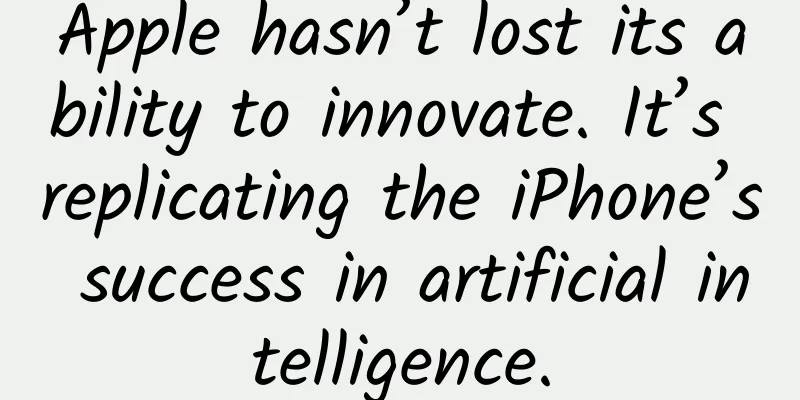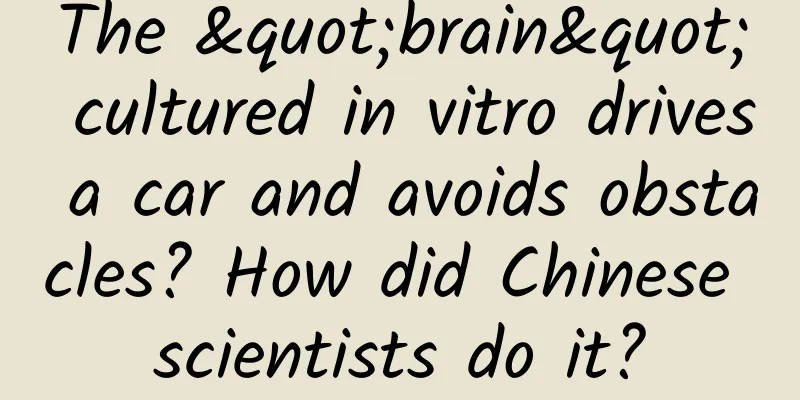Apple hasn’t lost its ability to innovate. It’s replicating the iPhone’s success in artificial intelligence.

|
The slowdown in smartphone sales is a well-known story, and the "APP economy" derived from it is also slowing down. Since last year, Silicon Valley unicorns have faced difficulties such as shrinking valuations, business streamlining, and employee resignation, and the market is in mourning. Forbes calls this year "the year of the fall of unicorns." The same story played out in the Chinese Internet market. In 2015, Xiaomi, a representative of smartphones, reportedly failed to achieve expected sales, and several life service companies merged. Now, the market has almost exhausted all the ideas based on smartphones, and any new ideas will attract a large number of companies to follow up - for example, there are more than 100 products following the popular live video streaming. Artificial intelligence is considered to be the next wave of technology. It can improve the existing technology ecosystem and solve some new problems. For example, when driving, users can use accurate voice technology to check real-time traffic conditions and driving routes. Based on this, artificial intelligence will also touch areas that smartphones have failed to transform, including industry, medicine, automobiles, agriculture, etc. Common large technology companies are all planning to enter the artificial intelligence market. Microsoft launched the voice assistant Cortana, which covers all Windows devices; Amazon launched the smart speaker Echo, targeting the home market; Google, which has the most extensive experience, has achieved coverage in the fields of driverless driving, image recognition, voice processing, and machine learning. What is Apple doing? 1. Apple’s AI LayoutApple launched its smart voice assistant earlier than its competitors. The iPhone 4s released in 2011 was equipped with Siri, a smart voice service acquired a year ago. Unfortunately, Apple failed to establish a leading advantage with Siri, and its hardware-first culture limited Siri's development. Five years after the acquisition, almost all of Siri's original team left Apple. After leaving, the two founders founded another smart voice company, Viv, which claimed to be smarter than Siri. But we can’t blame Apple for Siri’s failure. A few years ago, artificial intelligence hadn’t exploded, and smartphones and tablets were still growing at an astonishing rate. It was understandable that Apple focused its R&D resources on the hardware business. ( In the third quarter of this year, iPhone sales fell 15% year-on-year and revenue fell 23% year-on-year)Now it is different. The market has changed, and even Apple has to adjust its business according to the market environment. Since the second half of last year, Apple has begun to emphasize service revenue generation and has also increased its investment in artificial intelligence: - In October 2015, it acquired Vocal IQ, a British artificial intelligence company specializing in natural language processing and machine learning; - In October 2015, Apple acquired the artificial intelligence company Perceptio. Perceptio focuses on smartphone image recognition, and its deep learning technology allows mobile phones to recognize images without relying on external databases. Including the previous Vocal IQ, Apple acquired two artificial intelligence companies in just 5 days; - In January 2016, it acquired artificial intelligence company Emotient. Emotient’s technology can analyze facial expressions and identify emotions of people in images; - In August 2016, it acquired the artificial intelligence company Turi for $200 million. Turi was founded by a professor at the University of Washington and mainly provides developers with artificial intelligence research and development tools and frameworks. Turi provides a variety of development and management services such as building recommendation engines, identifying fraudulent behavior, analyzing user usage habits, and locating potential users. The acquired technologies were quickly digested and integrated into the Apple ecosystem. At the WWDC developer conference in June this year, Apple's three major systems - iOS, watchOS, and macOS - were all updated, and several important upgrades were related to artificial intelligence: - The system album can identify people and things in photos, search for corresponding photos based on people and things, and the system can also automatically classify photos according to different themes; - Siri is available on macOS desktop system and API interface is open, and Apple's intelligent voice service is open to more services and users; - Improve the display level of iOS search function. In iOS 10, global search can be used on the lock screen and in the pull-down notification, which will give Apple more opportunities to process text search and understand semantic commands; Apple also demonstrated using Siri to launch WeChat and convert voice into text and send it to a designated contact. These operations are supported by artificial intelligence technologies such as voice recognition, semantic analysis, and answer generation. Judging from the demonstration results, Apple's artificial intelligence technology can already achieve some very practical functions. (At WWDC, Apple demonstrated sending WeChat messages using Siri)2. Differential privacy allows Apple to achieve a balance between user privacy and improved servicesOne obstacle to the development of Apple's artificial intelligence technology is the lack of rich and detailed user data. Facebook and Google collect user data to improve their services in a targeted manner, but Apple has always been cautious about user data due to its emphasis on privacy. After the FBI asked Apple to unlock the iPhone in March this year, Apple's attitude became more conservative. This has somewhat limited the development of Apple's artificial intelligence. Without detailed user behavior data, it is difficult to make targeted improvements to services. Dr. Mo, a well-known Silicon Valley journalist, commented, "If a company knows you very well, you should worry that it may violate your privacy; but if a company knows very little about you, you have reason to doubt its ability to create efficient artificial intelligence." Fortunately, Apple quickly found the answer and announced that it would predict user behavior and needs through "Differential Privacy". The system first randomizes the data of a single user, then sends the data as a whole to Apple, and finally analyzes the data in batches to derive large-scale trends. Differential privacy does not require precise monitoring of individuals, so there is no need to worry about violating user privacy. In iOS 10, through differential privacy, the input method can find out the language trends of the group and give predictions in the associated vocabulary. It can also sort Emoji expressions and give priority to displaying commonly used expressions to avoid repeated searches. (Differential privacy is currently only used in iOS 10’s input method, search, and notes)The mobile phone ecosystem revolves around apps. Isolated apps fragment information and make it difficult for search engines to retrieve. Apple introduced "deep links" in iOS 9 to solve the problem of isolated app information, which can search for information about apps. In iOS 10, Apple further optimized the search function through differential privacy. Based on the trends reflected by overall user searches, the system can find the most popular deep links and assign them higher rankings, so that users can obtain more accurate information. Conclusion: With data centers under construction, Apple will widen the gap with its competitorsThe development of artificial intelligence depends on the improvement of computing power and data volume. Differential privacy solves the contradiction between collecting user privacy and improving services. Data is no longer a factor limiting the development of Apple's artificial intelligence. But Apple needs to improve its cloud computing capabilities, as it does not have an advantage in the cloud service sector. The market is currently dominated by Amazon, Microsoft, IBM, and Google, with the four companies accounting for 54% of the market share. (Gartner released the 2016Q2 cloud infrastructure service market statistics. The market is mainly controlled by Amazon, Microsoft, IBM, and Google)Apple is said to spend about $1 billion a year on cloud services for data storage, and it is working to reduce its cloud service spending. In March this year, Apple abandoned Amazon AWS and switched to Google GCP, which is cheaper. In order to avoid dependence on one company, Apple also uses Microsoft Azure cloud services. In addition, Apple is also building its own data center. In March this year, Apple's data center plan "Project McQueen" was exposed; five months later, Apple was rumored to invest $1 billion to build a data center and R&D center in Vietnam, and in the future it will also purchase land in Hong Kong and mainland China to build data centers. Building a data center by yourself is cheaper than using a third-party service, and it can also prevent the leakage of core data. In the long run, it can also promote the improvement of the company's cloud computing capabilities, which is crucial to improving artificial intelligence technology. Cook recently described his vision for artificial intelligence in an interview with The Washington Post, saying that Apple has been making progress. If data accumulation and data center construction go smoothly enough, Apple's artificial intelligence is expected to leave its competitors behind at a faster pace - just like the iPhone 9 years ago. As a winner of Toutiao's Qingyun Plan and Baijiahao's Bai+ Plan, the 2019 Baidu Digital Author of the Year, the Baijiahao's Most Popular Author in the Technology Field, the 2019 Sogou Technology and Culture Author, and the 2021 Baijiahao Quarterly Influential Creator, he has won many awards, including the 2013 Sohu Best Industry Media Person, the 2015 China New Media Entrepreneurship Competition Beijing Third Place, the 2015 Guangmang Experience Award, the 2015 China New Media Entrepreneurship Competition Finals Third Place, and the 2018 Baidu Dynamic Annual Powerful Celebrity. |
>>: Future form and powerful hits usher in a new era of growth for the MG brand
Recommend
iOS 15 beta 3 new features summary: Safari continues to improve
Apple today released the third beta of iOS 15 and...
Electric Technology Auto News: Tencent, which has been criticized as the original creator in the automotive industry, is Zotye really no longer plagiarizing?
When talking about domestic independent brands, Z...
It's all about technology and hard work? Are you edible if you buy a box of beef rolls for 9.9 yuan in the supermarket?
First of all, some "fat beef rolls" are...
The US TV industry is arguing over whether to bundle hundreds of channels into mandatory purchases
The US TV market is highly developed, with well-p...
95% of humans are silently infected: There is no vaccine for this virus that can cause terminal illness
Statistically speaking, the Epstein-Barr virus (a...
Thousands of children are injured or killed every year! Driving with a child without it is risking your life
Do you need to install a safety seat when driving...
How should tool apps operate?
Two days ago, a reader gave me a trial of their t...
The latest data rankings of 60 information flow platforms!
Today I bring you the latest traffic rankings of ...
Just now, the 2022 Nobel Prize in Chemistry was announced. They won the award for click chemistry and bioorthogonal chemistry
At 5:45 pm Beijing time on October 5, 2022, the 2...
Short video promotion: How to obtain accurate traffic?
The outline of this article is as follows: 1. Why...
Is a sore throat a sign of "double positive"? Will there be a large-scale epidemic in the near future? Latest tips →
Today (8th), the State Council’s Joint Prevention...
Shanghai official reminder! Doing this is very dangerous!
Recently, Shanghai's rumor-busting platform c...
Are curved screens the next battleground for mobile phone manufacturers?
Curved screens have become a trend in the future ...
How to position a short video account?
Nowadays, many people regard shooting short video...






![Kaikeba Smart Logistics—Order Delivery Planning [2,4]](/upload/images/67cc12d431291.webp)


